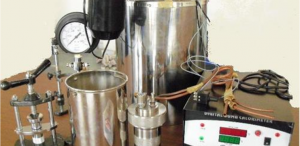Want to know how many calories you should eat to lose weight? The answer is simple: If You Want to Lose Weight, Calories Don’t Matter.
You might be a bit surprised by that answer (especially when doctors, nutritionists, and government agencies all have suggestions for how many calories you should eat if you want to lose weight). The truth is simple: your body is not a calorimeter. What is a calorimeter? It is the machine that food scientists use to determine how many calories food contains (Here is a picture).

The problems with using a machine to decide the value of food are many, but the biggest problem is that a calorimeter has no storage device (the way that you do).
What is a Calorie?
The first thing you need to know is what a calorie is.
Here is the definition: A calorie is the energy needed to increase the temperature of 1 gram of water by 1 °C. If you are wondering what that has to do with how much you should eat to lose weight, you are not alone. Food scientists stick an apple in the calorimeter and measure how much energy it produces when they burn that apple and that (supposedly) tells them how much energy you get from eating that apple. Scientists will tell you that a calorimeter is a good substitution for what happens in the body (but don’t you believe it).
Most people would say that a calorie is the amount of energy that stored in the food that we eat (and, basically, that is correct), but not the whole story.
If you take the common scientific wisdom about calories as truth, then you would say that everything that you eat has energy in it and that certain foods contain more energy than others. But that doesn’t have anything to do with the way your body process different foods. In order to lose weight, you have to focus on which foods you are eating, not how many calories the foods have.
Calories-in versus Calories-out is Bunk
In order to lose weight (food scientists suggest) you have to burn more calories than you take in, but what they forget is what happens to calories that you cannot use right away and there are ways to change what you are storing and what you are not.
You want to store calories? That is easy just keep your blood sugar high.
When your blood sugar is high, three things happen:
- No conversion of fat into energy: Since your body has enough energy running around your blood (in the form of glucose) it will not covert fats into energy. It takes energy to change fat into glucose and almost no energy to store fat as fat.
- No conversion of fructose into energy: In a strange twist, it seems easier for the body to store fructose (a sugar) as fat than it is to change it into energy (glucose). So that soda that is high in fructose goes straight to your hips.
- Fat storage increases: High sugar means high insulin (the hormone that controls sugar) and high insulin means that you will start to store fat.
As you can see, storing calories is easy when your blood sugar is high and the opposite is also true (keeping your blood sugar low means that you are not storing calories).
How Many Calories Should you Eat?
We all grew up with this idea that the more calories you eat, the heavier you will be, but this doesn’t recognize that our bodies has the ability to store calories and not completely burn them (like a calorimeter). And your body is especially good at storing calories when your blood sugar is high.
Instead of thinking how many calories should you eat to lose weight you need to start thinking about what kind of foods you need to eat to lose weight. The beauty of this approach is amazing; you no longer have to count calories and you can eat as much as you want (just pick the right foods).
Here are the basic steps of good weight loss:
- Keep sugar out of your life (this means you also have to avoid the foods that act like sugar).
- Eat plenty of fruits and vegetables: While you might have to watch that you are not eating too many starchy vegetables and sweet fruits, vegetables and fruits are the basis of a good diet.
- Exercise: Yes, you have to get out and move your buns around to lose some weight.
- Avoid dairy: Dairy foods are a common food allergens and tend to pack on the pounds. Try a week without and dairy foods (cheese, milk, yogurt…) and see what happens to your weight.
- Protein: Eat as much as you want of meats and other sources of protein.
Remember, if you want to lose weight, you have to stop saying “how many calories should I eat to lose weight?” and start saying “what foods should I eat to lose weight?”















I am struggling with the idea that I can eat as much of the “good foods” as I want. Nuts are on the list and they have lots of calories and fat. Before beginning this plan I have been dieting, eating 1300 calories or less each day. I don’t want to gain back what I have lost. Can I really eat unlimited amounts of the foods on the list and lose weight? Also, is flax on the good or bad list? What about Laughing Cow cheese? It would be good to spread in celery. What about Greek Gourmet Spreadable Cheese? Should I consider it a cheese or yogurt? Here’s the description: “New! Industry’s First Greek Gourmet Spreadable Cheese. Ideal for simple snacking, and easy entertaining, Green Mountain Farms Greek Gourmet Spreadable Cheese offers all the high-protein, low-fat, nutrition of Greek Yogurt with the wholesome tangy spreadability of cheese. Rich in flavor and delivers 3X Protein, 50% Less Fat, plus Live & Active Cultures. Spread on bagels or crackers or dig right into the patented recipe with veggie sticks and pretzels. Located in the dairy or refrigerated deli sections in four delicious flavors: Garlic & Herb, Cucumber Garlic, Roasted Red Pepper, and Sundried Tomato.”
Thanks for your help.
Kelly
Kelly,
I know it is hard to understand (or believe) when someone tells you a calorie is not a calorie. The problem is that our bodies metabolize different foods differently. When you, say, eat something that contains 100 calorie of fructose.The fructose leaves the stomach and goes to the liver. The liver now has two choice: either turn the fructose into glucose or store as fat. Well if the blood sugar is high (which it often is when people eat sugars) then the liver will turn that fructose into fat, but if the blood sugar is low, then it will convert the fructose into glucose. So, depending on the state of your body, you have just stored 100 calories of fat, or you haven’t. The same could be said of a 100 calorie meal of fructose as a straight sugar (say in juice) or 100 calories of fructose in an apple. The fiber in the apple will slow down the absorption of the fructose (keeping blood sugar from rising – and storing excess as fat), whereas the sugar in the juice goes straight into the bloodstream. These are just a few examples of many. Excess fat in the body comes from having too high of a blood sugar and this comes from eating sugars or foods that act like sugars – not from eating fat or protein.
Flax is on the good list. Cheese is alright too. Not sure about the spreadable cheese, take a look at the nutrition label for amount of carbohydrates.
Best of luck,
Dr. Scott
Very good information and somethings i definitely need to comply to…thanks. Lynn